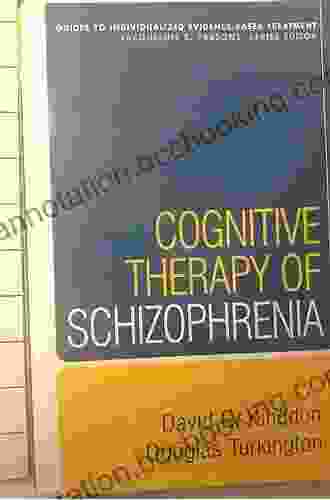Unveiling the Power of Cognitive Therapy in Schizophrenia: A Comprehensive Guide to Individualized, Evidence-Based Treatment

Schizophrenia, a debilitating mental health disFree Download, affects millions worldwide. While traditional treatments have focused on medication, cognitive therapy has emerged as a promising approach, offering hope for improved outcomes. Our comprehensive guide illuminates the latest evidence-based techniques, empowering you to tailor treatment to each patient's unique needs.
Understanding Schizophrenia
Schizophrenia is characterized by a range of symptoms, including hallucinations, delusions, disorganized thinking, and social withdrawal. These symptoms can significantly impair a person's ability to function in everyday life.
4.7 out of 5
| Language | : | English |
| File size | : | 5323 KB |
| Text-to-Speech | : | Enabled |
| Screen Reader | : | Supported |
| Enhanced typesetting | : | Enabled |
| Word Wise | : | Enabled |
| Print length | : | 219 pages |
Cognitive therapy aims to address the underlying thought patterns and beliefs that contribute to these symptoms. By identifying and challenging these maladaptive cognitions, patients can develop more realistic and adaptive ways of thinking, leading to improved symptom control and overall functioning.
Evidence-Based Cognitive Therapies for Schizophrenia
Over the past few decades, numerous cognitive therapy interventions have been developed specifically for schizophrenia. These therapies have been rigorously tested and have demonstrated significant efficacy in reducing symptoms and improving outcomes.
Some of the most well-established evidence-based cognitive therapies for schizophrenia include:
- Cognitive Behavioral Therapy for Schizophrenia (CBTs)
- Metacognitive Training (MCT)
- Social Cognitive Training (SCT)
- Cognitive Enhancement Therapy (CET)
Cognitive Behavioral Therapy for Schizophrenia (CBTs)
CBTs is a structured therapy that focuses on identifying and challenging maladaptive thoughts and behaviors that contribute to schizophrenia symptoms. It teaches patients skills to cope with distressing thoughts and emotions, improve problem-solving abilities, and engage in healthy social interactions.
Metacognitive Training (MCT)
MCT aims to improve patients' metacognitive abilities, which refer to their ability to understand and control their own thinking. It teaches patients to identify and evaluate their thoughts, recognize cognitive biases, and develop more flexible thinking patterns.
Social Cognitive Training (SCT)
SCT focuses on improving patients' social cognition, including their ability to understand and respond to social cues, interpret facial expressions, and engage in effective social interactions. It helps patients develop social skills and strategies for building and maintaining relationships.
Cognitive Enhancement Therapy (CET)
CET aims to improve cognitive functioning in patients with schizophrenia, particularly in areas such as attention, memory, and executive function. It uses computer-based exercises and structured training programs to enhance cognitive abilities and improve overall cognitive performance.
Individualized Treatment Planning
While these evidence-based therapies provide a foundation for treatment, it is crucial to tailor interventions to each patient's unique needs and circumstances. Individualized treatment planning involves:
- Conducting a thorough assessment to identify the specific symptoms and cognitive difficulties a patient is experiencing.
- Selecting the most appropriate cognitive therapy intervention based on the assessment findings.
- Developing a personalized treatment plan that outlines the specific goals, techniques, and strategies to be used in therapy.
- Continuously monitoring progress and making adjustments to the treatment plan as needed.
Benefits of Cognitive Therapy for Schizophrenia
Numerous studies have demonstrated the benefits of cognitive therapy for schizophrenia. Patients who undergo cognitive therapy experience:
- Reduced positive symptoms (e.g., hallucinations, delusions)
- Improved negative symptoms (e.g., social withdrawal, lack of motivation)
- Enhanced cognitive functioning
- Increased social skills and functioning
- Reduced risk of relapse
- Improved quality of life
Cognitive therapy is a powerful tool that can significantly benefit individuals with schizophrenia. By providing evidence-based techniques and empowering clinicians to tailor treatment to each patient's unique needs, this approach offers hope for improved symptom control, enhanced functioning, and a better quality of life.
Our comprehensive guide provides a roadmap for implementing individualized cognitive therapy interventions for schizophrenia. By embracing the principles and strategies outlined in this guide, you can effectively harness the transformative power of cognitive therapy, empowering your patients to live fuller and more meaningful lives.
Learn more about Cognitive Therapy of Schizophrenia
Image Alt Attributes:
- <img src="person-with-schizophrenia.jpg" alt="A person experiencing hallucinations, a common symptom of schizophrenia.">
- <img src="cognitive-therapist.jpg" alt="A cognitive therapist talking to a client with schizophrenia.">
- <img src="cognitive-therapy-session.jpg" alt="A group of people participating in a cognitive therapy session.">
4.7 out of 5
| Language | : | English |
| File size | : | 5323 KB |
| Text-to-Speech | : | Enabled |
| Screen Reader | : | Supported |
| Enhanced typesetting | : | Enabled |
| Word Wise | : | Enabled |
| Print length | : | 219 pages |
Do you want to contribute by writing guest posts on this blog?
Please contact us and send us a resume of previous articles that you have written.
 Book
Book Novel
Novel Page
Page Chapter
Chapter Text
Text Story
Story Genre
Genre Reader
Reader Library
Library Paperback
Paperback E-book
E-book Magazine
Magazine Newspaper
Newspaper Paragraph
Paragraph Sentence
Sentence Bookmark
Bookmark Shelf
Shelf Glossary
Glossary Bibliography
Bibliography Foreword
Foreword Preface
Preface Synopsis
Synopsis Annotation
Annotation Footnote
Footnote Manuscript
Manuscript Scroll
Scroll Codex
Codex Tome
Tome Bestseller
Bestseller Classics
Classics Library card
Library card Narrative
Narrative Biography
Biography Autobiography
Autobiography Memoir
Memoir Reference
Reference Encyclopedia
Encyclopedia Craig Caudill
Craig Caudill Steve Hagen
Steve Hagen Gretchen Davis
Gretchen Davis Laurent Bernut
Laurent Bernut Jason Hall
Jason Hall David Morgan
David Morgan Viv Albertine
Viv Albertine Cindy Entin
Cindy Entin Jack Falla
Jack Falla Gail Anthea Brown
Gail Anthea Brown Laura Coates
Laura Coates Verna Fisher
Verna Fisher Course Hero
Course Hero Janna Herron
Janna Herron Cute Amigurumi
Cute Amigurumi Gerri Hirshey
Gerri Hirshey Prarthana Gahilote
Prarthana Gahilote Martin Kratt
Martin Kratt Tara Grayce
Tara Grayce Kyle West
Kyle West
Light bulbAdvertise smarter! Our strategic ad space ensures maximum exposure. Reserve your spot today!

 Chadwick PowellFalcons of Narabedla: Death Between the Stars, The Dark Intruder, and The...
Chadwick PowellFalcons of Narabedla: Death Between the Stars, The Dark Intruder, and The... Efrain PowellFollow ·15k
Efrain PowellFollow ·15k Jared PowellFollow ·15.8k
Jared PowellFollow ·15.8k Darren NelsonFollow ·15.6k
Darren NelsonFollow ·15.6k Ike BellFollow ·18.8k
Ike BellFollow ·18.8k Joel MitchellFollow ·5.5k
Joel MitchellFollow ·5.5k Juan ButlerFollow ·14k
Juan ButlerFollow ·14k John GrishamFollow ·4.7k
John GrishamFollow ·4.7k Amir SimmonsFollow ·6.7k
Amir SimmonsFollow ·6.7k

 Voltaire
VoltaireStories From The Jim Crow Museum: Unveiling the Haunting...
A Journey into the Depths of...

 F. Scott Fitzgerald
F. Scott FitzgeraldCalling Sorcery And Society: Illuminating the...
: The Alluring Embrace of Sorcery ...

 Marcel Proust
Marcel ProustBranding Bud: Unveiling the Green Rush
As the legalization...

 Henry Wadsworth Longfellow
Henry Wadsworth LongfellowColorful Dreamer: The Story of Artist Henri Matisse
Henri Matisse was a French artist...

 Adrian Ward
Adrian WardDelving into the Tapestry of Black British Identity: A...
In the realm of historical...
4.7 out of 5
| Language | : | English |
| File size | : | 5323 KB |
| Text-to-Speech | : | Enabled |
| Screen Reader | : | Supported |
| Enhanced typesetting | : | Enabled |
| Word Wise | : | Enabled |
| Print length | : | 219 pages |












